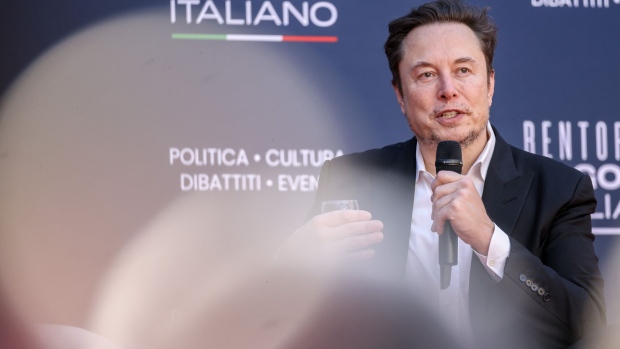Jan 31, 2024
Musk Pay Judge Slams ‘Supine’ Tesla Board. Here’s Who Signed Off
, Bloomberg News

(Bloomberg) -- The judge who rejected Elon Musk’s $55 billion Tesla Inc. compensation package likened the board that approved it to “supine servants of an overweening master” rather than independent directors looking out for shareholders.
In her 200-page decision, Delaware Chancery Court Judge Kathaleen St. J. McCormick focused on six board members she called “the decision makers,” five of whom she said were conflicted by their personal or business ties to Musk. Two were close friends who often vacationed and socialized with Musk, while three others were “beholden” to him in other ways, the judge said.
One of the directors made $280 million exercising options she was paid at Tesla, McCormick noted.
“Neither the compensation committee nor the board acted in the best interests of the company when negotiating Musk’s compensation plan,” the judge said. “In fact, there is barely any evidence of negotiations at all. Rather than negotiate against Musk with the mindset of a third party, the compensation committee worked alongside him, almost as an advisory body.”
Musk, his brother Kimbal and venture capitalist Steve Jurvetson were also on the nine-member Tesla board but didn’t participate in the 2018 votes on the pay package. Here are the directors who unanimously approved it:
Ira Ehrenpreis
Ehrenpreis, a Tesla director since 2007, chaired the board’s four-member compensation committee, which was responsible for negotiating the pay package. The founder of venture capital firm DBL Partners, Ehrenpreis netted $200 million from selling some of his Tesla options in 2021 and also had $75 million invested in other Musk-controlled companies, the judge noted. He was also invested in Kimbal Musk’s restaurant group, and had testified that his longtime relationship with the Musks had a “significant influence on his professional career.” McCormick said Ehrenpreis’ failure to negotiate with Musk showed he was “beholden” to him.
Antonio J. Gracias
Gracias, also a compensation committee member, probably had the closest personal and business relationship to Musk. The founder of Valor Equity Partners, Gracias was the third-largest individual investor in Tesla in 2017, the judge noted, and his stake was worth $1 billion in 2021. Valor and Gracias have also invested hundreds of millions of dollars in other Musk ventures, including SpaceX, SolarCity, The Boring Company, and Neuralink. Musk and his brother have in turn invested in Valor. In addition to their business ties, Musk and Gracias socialize as often as once a month, have spent Christmas together and have a longstanding tradition of spending Presidents Day weekend together at Gracias’ home in Jackson Hole, Wyoming. They’ve also vacationed together, including at illusionist David Copperfield’s Bahamas retreat. “The combination of business and personal ties make it undeniable that Gracias lacked independence from Musk.” McCormick said.
James Murdoch
Murdoch, the younger son of media mogul Rupert, was a board member who wasn’t on the compensation committee but voted on the pay package. Murdoch testified at the trial that he met Musk in the late 1990s, but they fell out of touch until becoming friends in 2006 or 2007, when Murdoch bought a Tesla Roadster. Since then, they’ve become close, vacationing together with their families in Israel, Mexico, and the Bahamas. It was during one of those trips, which Gracias also attended, that Murdoch was recruited to the Tesla board. The judge said Murdoch was conflicted due to his personal ties, though she also noted that he owned 10,485 Tesla shares through a family trust, personally invested $20 million in SpaceX and another $50 million through his private investment company.
Bradley W. Buss
Buss was a member of the board and compensation committee. A retired accountant and former chief financial officer of SolarCity Corp., Musk’s solar energy company that was acquired by Tesla in 2016, Buss had no personal relationship with Musk, according to the judge. But she found that Buss was beholden because nearly half his net worth was derived from his relationship to Musk. McCormick noted that he was paid $2 million at SolarCity, then received $17 million in compensation for service as a Tesla director between 2011 and 2018. He realized $24 million from his sale of Tesla shares before 2018.
Robyn M. Denholm
Denholm, a former executive at Telstra Corp. and Juniper Networks Inc., joined the board and compensation committee in 2014. Like Buss, who recruited her, Denholm had no personal ties to Musk. But McCormick ruled that she lacked independence because she owed most of her wealth to her service as a Tesla director. She was paid $17 million between 2014 and 2017 but made $280 million exercising her Tesla options in 2021 and 2022, which she called “life-changing.”
Linda Johnson Rice
Johnson Rice was the only Tesla director McCormick found was not conflicted, though she also voted to approve Musk’s pay package. The former chair of Johnson Publishing Co., the now-defunct publisher of Ebony and Jet magazines, she was granted options for her work on the board but let them expire without being exercised, according to the judge. According to her personal website, she’s currently on the board of Omnicom Media Group and Enova International as well as a trustee of the Art Institute of Chicago.
©2024 Bloomberg L.P.





